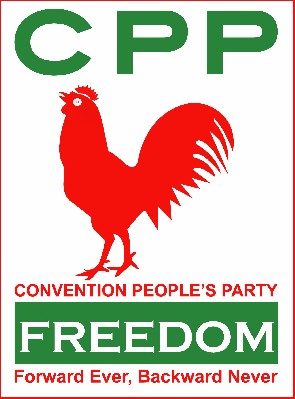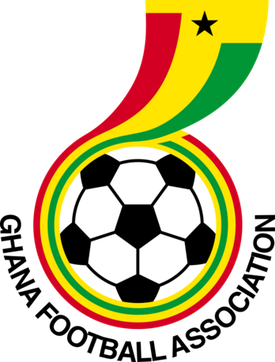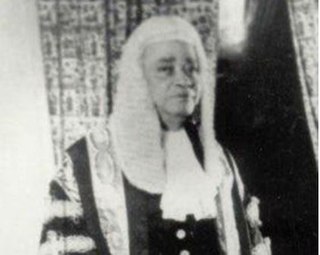 |
|---|
| Constitution |
General elections were held in Gold Coast in 1935.
 |
|---|
| Constitution |
General elections were held in Gold Coast in 1935.
The Legislative Council had 30 members, of which 16 were 'official' members (civil servants) and 14 'unofficial' members. [1] [2] Of the 14 unofficial members, three were Europeans appointed by the Governor to represent banking, mercantile and shipping interests, and two were Europeans elected by the Chamber of Commerce and Chamber of Mines. The remaining nine unofficial members were Africans, six of which were elected by the Provincial Councils (three by the Eastern Province Council, two by the Central Province Council and one by the Western Province Council) and three directly elected members representing the municipalities of Accra, Cape Coast and Sekondi. [1] The elections were held under a severely limited franchise, with only 4,058 people registered to vote in Accra from a population of around 60,000. [3]
In Accra the contest was a re-run of the 1931 elections, with incumbent MLC Frederick Nanka-Bruce again challenged by Kojo Thompson. The after-effects of the Great Depression had increased opposition to colonial rule, with Nanka-Bruce's ineffective performance in the Legislative Council benefiting Thompson. [4] The media campaign quickly descended into abuse; [5] Nanka-Bruce was supported only by the Gold Coast Independent (which he owned) and the Times of West Africa, whilst Thompson received the backing of the African Morning Post (and its editor Nnamdi Azikiwe), the Gold Coast Spectator, the Provincial Pioneer and Vox Populi. [4] The African Morning Post accused Nanka-Bruce of being a "sycophantic Uncle Tom, an ultra-moderate stooge, a self-seeker, a traitor and a mummified yes-man". [5] Nanka-Bruce used his Gold Coast Independent to label Thompson as an immoral opportunist in twelve successive issues. [5]
Nanka-Bruce was supported by the Accra Ratepayers Association, the Asere Kowulu Party and the Ga Mashi Party. Thompson was supported by the Mambii Party, the Akwapem Improvement Association, the Ashanti Kotoko Society and the West African Youth League (and its founder I. T. A. Wallace-Johnson). [5] On the day before the elections, the Gã Mantse called on his subjects to vote for Thompson. [4]
As in the 1931 elections, Kobina Arku Korsah was re-elected in Cape Coast and George James Christian in Sekondi. [6] In Accra, Thompson narrowly defeated Nanka-Bruce by 1,030 votes to 926. [4] Voter turnout was surprisingly less than 50%. [7] However, the tactics of Thompson's supporters, which included blocking access to polling stations for elderly Nanka-Bruce supporters, led to the result being overturned in court when Nanka-Bruce challenged the outcome, [4] the official ruling citing "undue influence of gong-gong beating" and 124 cases of impersonation. [3] By the time the re-run took place on 16 April 1936, the Town Clerk had reduced the voter roll to only 2,858 by removing over 1,200 deceased residents. [8] Thompson surprisingly won again with a slightly increased majority of 1,022 votes to 867. [3]

The Gold Coast was a British Crown colony on the Gulf of Guinea in West Africa from 1821 until its independence in 1957 as Ghana. The term Gold Coast is also often used to describe all of the four separate jurisdictions that were under the administration of the Governor of the Gold Coast. These were the Gold Coast itself, Ashanti, the Northern Territories protectorate and the British Togoland trust territory.

The Convention People's Party (CPP) is a socialist political party in Ghana based on the ideas of the first President of Ghana, Kwame Nkrumah. The CPP was formed in June 1949 after Nkrumah broke away from the United Gold Coast Convention (UGCC).

The Ghana Football Association (GFA) is the governing body of association football in Ghana, based in the capital city, Accra. Founded in 1957 to replace the Gold Coast Football Association which was founded in 1920, it organizes and governs Ghana's football leagues, football cup competitions and national teams.

Sir Emmanuel Charles Quist, also known as Paa Quist was a barrister, educator and judge who served as the first Speaker of the Gold Coast Legislative Assembly and the first Speaker of the Parliament of Ghana.

General elections were held in Gold Coast on 8 February 1951. Although elections had been held for the Legislative Council since 1925, the Council did not have complete control over the legislation, and the voting franchise was limited to residents of urban areas meeting property requirements and the councils of chiefs.
Thomas Hutton-Mills, born Thomas Hutton Mills was a lawyer and nationalist leader in the Gold Coast. He is often referred to as Thomas Hutton-Mills Sr. to distinguish him from his son, the lawyer and diplomat Thomas Hutton-Mills Jr. (1894–1959).
Frederick Victor Nanka-Bruce was a physician, journalist and politician in the Gold Coast. He was the third African to practise orthodox medicine in the colony, after Benjamin Quartey-Papafio and Ernest James Hayford.

Benjamin William Quarteyquaye Quartey-Papafio, was a physician pioneer and politician on the Gold Coast - the first Ghanaian to obtain the medical degree (M.D) and the first to practise as an orthodox-trained physician.

General elections were held in the Gold Coast in June 1946. Constitutional amendments on 29 March 1946 enabled the colony to be the first in Africa to have a majority of black members in its legislature; of the Legislative Council's 32 members, 21 were black, including all 18 elected members. The first meeting of the Legislative Council was on 23 July 1946.

General elections were held in Gold Coast in August 1927, the first direct elections in the territory.

Andrew Kofi Egyapa Mercer is a Ghanaian lawyer and politician. He is a member of the New Patriotic Party. He is the incumbent Member of Parliament for the Sekondi Constituency in the Western Region of Ghana. He succeeded Papa Owusu-Ankomah, who had been MP for 20 years.
Gold Coast Euro-Africans were a historical demographic based in coastal urban settlements in colonial Ghana, that arose from unions between European men and African women from the late 15th century – the decade between 1471 and 1482, until the mid-20th century, circa 1957, when Ghana attained its independence. In this period, different geographic areas of the Gold Coast were politically controlled at various times by the Portuguese, Germans, Swedes, Danes, Dutch and the British. There are also records of merchants of other European nationalities such as the Spaniards, French, Italians and Irish, operating along the coast, in addition to American sailors and traders from New York, Massachusetts and Rhode Island. Euro-Africans were influential in intellectual, technocratic, artisanal, commercial and public life in general, actively participating in multiple fields of scholarly and civic importance. Scholars have referred to this Euro-African population of the Gold Coast as "mulattos", "mulatofoi" and "owulai" among other descriptions. The term, owula conveys contemporary notions of "gentlemanliness, learning and urbanity" or "a salaried big man" in the Ga language. The cross-cultural interactions between Europeans and Africans were mercantile-driven and an avenue to boost social capital for economic and political gain i.e. "wealth and power". The growth and development of Christianity during the colonial period also instituted motifs of modernity vis-à-vis Euro-African identity. This model created a spectrum of practices, ranging from a full celebration of native African customs to a total embrace and acculturation of European culture.
Jonathan Kwesi Lamptey was a Ghanaian politician. He was a senior figure in the CPP who later joined the opposition, subsequently playing leading roles in the government of the second republic.
Theophilus Dougan Brodie-Mends was a Ghanaian journalist, lawyer and politician. He was a member of the first Parliament of the second Republic. He also served as Minister of Information and Minister of Lands and Mineral Resources and also Minister of State during the Busia government.
The National Democratic Party (NDP) was a right-wing political party active in the Gold Coast in the early 1950s.
Ashford Emmanuel Inkumsah was a Ghanaian chemist and politician. He occupied various ministerial portfolios during the first republic. He was the first deputy speaker of parliament from 1965 to 1966.

General elections were held in Gold Coast in 1931.

General elections were held in Gold Coast in 1944.

The Political history of Ghana recounts the history of varying political systems that existed in Ghana during pre-colonial times, the colonial era and after independence. Pre-colonial Ghana was made up of several states and ethnic groups whose political system was categorized by 3 main administrative models; Centralized, Non-centralized and Theocratic states. In the colonial era, the British Empire employed different forms of government among its four territorial possessions in the Gold Coast. Indirect rule was implemented in the late 19th century after its success in Northern Nigeria. From the 1940s, native Ghanaians yearned for more autonomy. This resulted in the several constitutional reforms as well as the creation of the office of the Prime Minister in 1952.